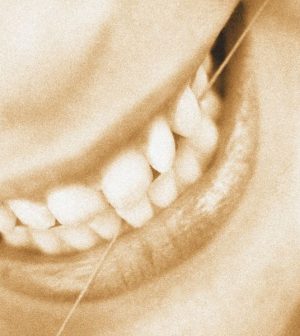- Could Your Grocery Store Meat Be Causing Recurring UTIs?
- Are You Making This Expensive Thermostat Error This Winter?
- Recognizing the Signs of Hypothyroidism
- 10 Strategies to Overcome Insomnia
- Could Artificial Sweeteners Be Aging the Brain Faster?
- Techniques for Soothing Your Nervous System
- Does the Water in Your House Smell Funny? Here’s Why
- Can a Daily Dose of Apple Cider Vinegar Actually Aid Weight Loss?
- 6 Health Beverages That Can Actually Spike Your Blood Sugar
- Treatment Options for Social Anxiety Disorder
Gum Disease Tied to Yet Another Deadly Illness

Add one more reason to why you should brush and floss regularly: Gum disease bacteria are now tied to higher odds of esophageal cancer.
The study tracked the oral health of 122,000 Americans for 10 years. It found that the presence of two types of bacteria linked with gum disease may hike the risk of the cancer.
The presence of one oral bacterium in particular, called Tannerella forsythia, was tied to a 21 percent increase in the odds of developing esophageal tumors, said a team led by Jiyoung Ahn. She is associate director for population science at NYU Langone Health in New York City.
Gum disease has already been linked in numerous studies to a heightened risk of the number one killer, heart disease. But an expert in esophageal cancer who reviewed the new findings stressed that researchers can’t yet prove a causal link to esophageal tumors.
“What is not clear is whether the presence of these bacteria or the resultant periodontal disease is primarily responsible for the development of cancer,” said Dr. Anthony Starpoli, associate director of esophageal endotherapy at Lenox Hill Hospital in New York City.
Still, Starpoli believes specialists should “consider a proper evaluation of the oral cavity as well as the remainder of the digestive tract in the hope of early diagnosis of esophageal cancer.”
Esophageal cancer is the eighth most common cancer and the sixth leading cause of cancer death worldwide, the study authors noted. Because it’s often only diagnosed at an advanced stage, five-year survival rates are between 15 to 25 percent.
Ahn said, “Esophageal cancer is a highly fatal cancer, and there is an urgent need for new avenues of prevention, risk stratification, and early detection.”
The news from the study wasn’t all bad: The investigators found that some types of mouth bacteria were associated with a lower risk of esophageal cancer.
Learning more about the bacteria communities living naturally in the mouth “may potentially lead to strategies to prevent esophageal cancer, or at least to identify it at earlier stages,” Ahn noted in a news release from the American Association for Cancer Research.
One other expert agreed.
“The study suggests that there are some oral bacteria that may contribute to the development of this highly deadly cancer but also, and very importantly, suggests that some bacteria may provide a protective effect,” said Dr. Robert Kelsch. He’s an oral pathologist at Northwell Health in New Hyde Park, N.Y.
“Knowing which bacteria are good and which are bad could lead to preventive treatments or serve as predictors of risk of development of this cancer,” Kelsch said.
Ahn added that good oral health — including regular tooth brushing and dental visits — may help protect against gum disease and health conditions associated with it.
The study findings were published Dec. 1 in the journal Cancer Research.
More information
The U.S. National Cancer Institute has more on esophageal cancer.
Source: HealthDay
Copyright © 2026 HealthDay. All rights reserved.










